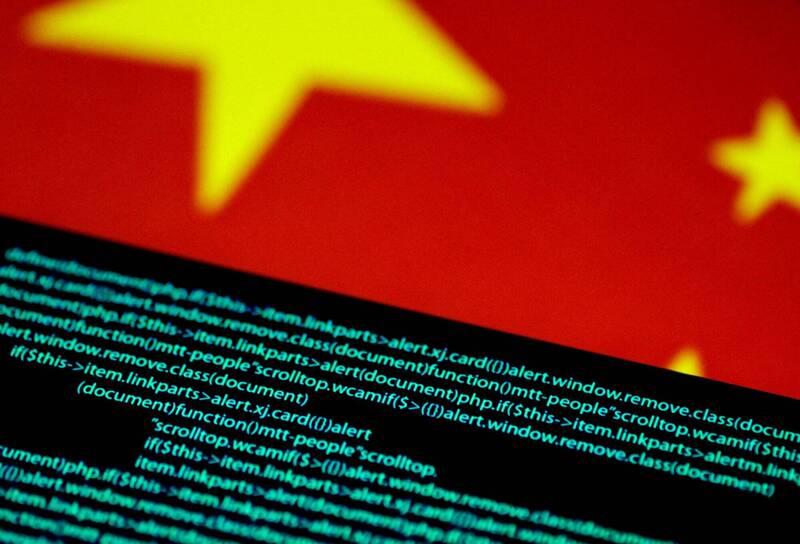China’s accusations that Taiwan has been carrying out cyberattacks are fabricated from public images in an attempt to intimidate and pressure Taiwanese people, the Information, Communications and Electronic Force Command (ICEFCOM) said today.
The Chinese Ministry of State Security in a statement today claimed that ICEFCOM has been carrying out cyberattacks against China since its establishment in 2017.
The Chinese national security agency identified four people who have allegedly carried out the cyberattacks and disclosed their personal information.

Photo: Reuters
It claimed that ICEFCOM’s Cyber Warfare Unit has recruited hackers to target China’s key infrastructure.
The Cyber Warfare Unit is dedicated to safeguarding national defense information and ensuring cybersecurity, like in other democratic nations, ICEFCOM said in response, denying the accusations.
China’s accusations are based on manipulated public images and expose its aggressive mindset toward intimidating Taiwan, it said.
China has been increasing its military threats in the Indo-Pacific region in the past few years, using aircraft and ships to harass Taiwan and other neighboring countries, ICEFCOM said.
It has also been carrying out cyberattacks and other “gray zone” intimidation tactics, it said.
These actions, which openly challenge international order and threaten regional stability, have been widely condemned by multiple countries and reinforce China’s reputation as a global troublemaker, it said.
The organization said that its personnel defend national security and are the first line of defense against enemy cyberattacks.
It vowed to continue to strengthen information security and the army’s digital resilience, using Taiwan’s cyberdefense capabilities to protect its digital territory and ensure national security.

A preclearance service to facilitate entry for people traveling to select airports in Japan would be available from Thursday next week to Feb. 25 at Taiwan Taoyuan International Airport, Taoyuan International Airport Corp (TIAC) said on Tuesday. The service was first made available to Taiwanese travelers throughout the winter vacation of 2024 and during the Lunar New Year holiday. In addition to flights to the Japanese cities of Hakodate, Asahikawa, Akita, Sendai, Niigata, Okayama, Takamatsu, Kumamoto and Kagoshima, the service would be available to travelers to Kobe and Oita. The service can be accessed by passengers of 15 flight routes operated by

MORE FALL: An investigation into one of Xi’s key cronies, part of a broader ‘anti-corruption’ drive, indicates that he might have a deep distrust in the military, an expert said China’s latest military purge underscores systemic risks in its shift from collective leadership to sole rule under Chinese President Xi Jinping (習近平), and could disrupt its chain of command and military capabilities, a national security official said yesterday. If decisionmaking within the Chinese Communist Party has become “irrational” under one-man rule, the Taiwan Strait and the regional situation must be approached with extreme caution, given unforeseen risks, they added. The anonymous official made the remarks as China’s Central Military Commission Vice Chairman Zhang Youxia (張又俠) and Joint Staff Department Chief of Staff Liu Zhenli (劉振立) were reportedly being investigated for suspected “serious

ENHANCING EFFICIENCY: The apron can accommodate 16 airplanes overnight at Taoyuan airport while work on the third runway continues, the transport minister said A new temporary overnight parking apron at Taiwan Taoyuan International Airport is to start operating on Friday next week to boost operational efficiency while the third runway is being constructed, the Ministry of Transportation and Communications said yesterday. The apron — one of the crucial projects in the construction of the third runway — can accommodate 16 aircraft overnight at the nation’s largest international airport, Minister of Transportation and Communications Chen Shih-kai (陳世凱) told reporters while inspecting the new facility yesterday morning. Aside from providing the airport operator with greater flexibility in aircraft parking during the third runway construction,

American climber Alex Honnold is to attempt a free climb of Taipei 101 today at 9am, with traffic closures around the skyscraper. To accommodate the climb attempt and filming, the Taipei Department of Transportation said traffic controls would be enforced around the Taipei 101 area. If weather conditions delay the climb, the restrictions would be pushed back to tomorrow. Traffic controls would be in place today from 7am to 11am around the Taipei 101 area, the department said. Songzhi Road would be fully closed in both directions between Songlian Road and Xinyi Road Sec 5, it said, adding that bidirectional traffic controls would